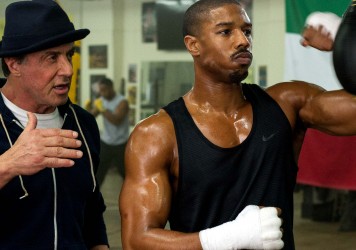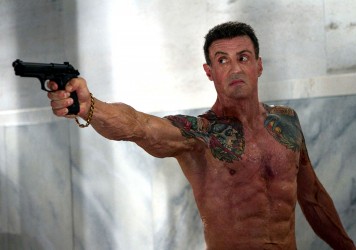A cast of thousands coalesce for this jolly, bloodless third sortie by those irrepressible, elderly Expendables.
The entire career of actor and director Sylvester Stallone has been based on the notion that he’s a man out of time. Actually, it’s not that. It’s more an illogically staunch belief that he’s a man in time, and it’s the rest of the world that’s out of synch. While fashion and technological advancement dictate that the future is a place of implacable sheen and life-improving gizmoids, Sly opts to remain in (or, at least, be a walking promotion of) a state of full-bore macho retardation.
He projects himself as the kind of burley work-shirt mannequin who completes banal household tasks with an over-sized Bowie knife. While you’re sat there depth-charging guava smoothies and in your cosy state-funded arts retreat, Sly’s splashing back boilermakers and switching the platters on the jukebox with the butt of a .44 Magnum. And don’t be fooled by that badass hip-flask — it probably contains milky tea.
So, it comes as little surprise that The Expendables 3 is yet another iteration of this fervent creed, even down to the fact that its title rejects a fashionable, colon-based suffix. Boasting a bloated cast list which harks back to the ensemble disaster movies of the ’70s, the film, as with the previous two entries, is an act of unalloyed nostalgia, from its ultra-schematic plot and stock action locations (dock yard, hotel, art gallery) to characters with a predilection for violence and scenes which are connected via travel in a refurbished, propeller-driven war plane.
The job of the critic is rendered all-but moot by a film like this. You don’t require words written on a digital page to know how such a movie plays out. It’s best to simply free-associate — think of Ronald Reagan’s flaming ghost firing a RPG into an Apple store. Or the song ‘Free Bird’ playing while a tumbledown nursing home is coated with non-regulation motor oil. Or just an endless montage of Golden Eagle steaks sizzling on a barbecue while an elderly ex-serviceman (honourably discharged) says the word “America” ad infinitum while crying. Why innovate when everything is already there for the taking?
And yet, even though this third film has nothing at all new to add to the conversation (is there a movie franchise in history whose episodes are as indistinct as this?), The Expendables 3 still somehow manages to be the strongest in the series film thus far. Cinema’s ability to enhance and romanticise reality is used to its fullest, from a quaint sequence which sees Stallone sprinting across a rooftop, to a new generation of young Expendables doing awkward, hastily-learned karaoke along to Neil Young’s ‘Old Man’ in a blues bar. The sole change from its forebears is that Sly’s director avatar, Patrick Hughes, has opted to dial back the gore quotient in order to deliver the geriatric derring do of the Expendables to an audience of impressionable 12-year olds.
It’s a wise tactic, and for a number of reasons. Firstly, despite the stringent dictates of the censors, the films to which The Expendables 3 makes reference (Cobra, Passenger 57, Predator, Twins, Commando, The Terminator, etc) will all be staples of the juvenile (male) viewer. Secondly, this film is entirely bloodless, so you get all the action and none of the violence. Perhaps, morally, it would be a more honest gesture to show the bloody upshot of when tooled-up pan-European henchmen march onto the screen to be mechanically cut down by gunfire.
Yet, in avoiding all that gory faff, it means the Hughes can concentrate more on the choreography of the fights and is forced to think where the camera is in relation to the bodies he’s filming. In many ways this film is just as violent as the first two, but the lack of blood means that it can bob through some outmoded censorship loopholes. Its only gamble is that the 12-year-olds themselves may feel cheated by the lack of splat, having already been conditioned on the first two features.
It’s a triumphantly right-wing film, and there’s no real reason for lefties to get upset by some of its more outré beliefs — Stallone’s films always appear to promote the idea that law courts are a sham and that justice needs to be taken into the (gun-weilding) hands of the people. And if its political outlook weren’t forthright enough, Jet Li is rolled in for the big showdown so as to be the butt of a bunch of jokes about how Asian people are quite short, plus the final battle takes place in the fictional country of “Assmanistan”.
MVPs are Wesley Snipes, whose first uttered line is an apologia for his tax evasion, and then later Antonio Banderas, who plays the only character in the entire saga with a discernible and mildly eccentric character trait. All told, it’s good, clean retrograde fun.
Published 13 Aug 2014
After the disappointing second episode, the only way is up.
So aggressively old school in every way that it’s actually rather charming.
Maybe it’s time to take these mercenaries round the back of the barn...

The necessary evil of shooting bad guys is the subject of this heinous new offering from Michael Bay.

By Ashley Clark
A franchise is reborn in sensational fashion courtesy of director Ryan Coogler and star Michael B Jordan.

Slam-bang action icons Walter Hill and Sylvester Stallone buddy up for some muscle-flexing and gunplay.